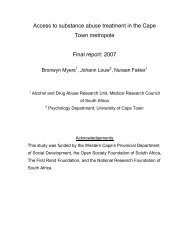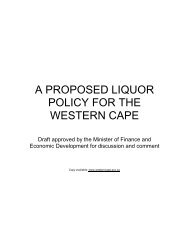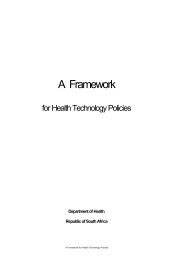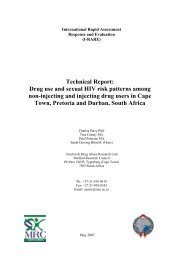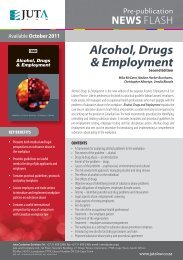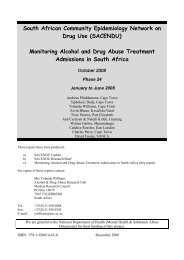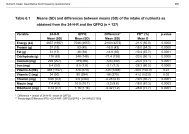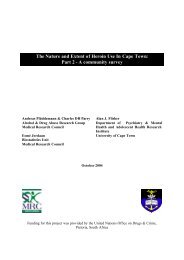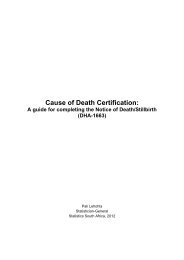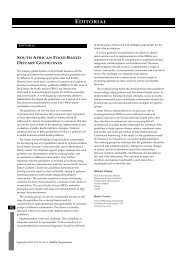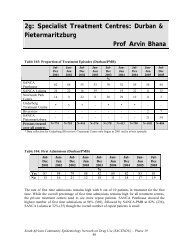Audit of Substance Abuse Treatment Facilities in ... - SA HealthInfo
Audit of Substance Abuse Treatment Facilities in ... - SA HealthInfo
Audit of Substance Abuse Treatment Facilities in ... - SA HealthInfo
- No tags were found...
You also want an ePaper? Increase the reach of your titles
YUMPU automatically turns print PDFs into web optimized ePapers that Google loves.
previous audits <strong>of</strong> specialist substance abuse treatment facilities <strong>in</strong> Cape Town (Myers &Parry, 2003); Gauteng (Myers, 2004) as well as Gauteng and KwaZulu-Natal (Myers &Fakier, 2007).4.2.1. Provision <strong>of</strong> ancillary mental health servicesIn all 5 prov<strong>in</strong>ces, substance abuse treatment facilities focus primarily on treat<strong>in</strong>g the coresubstance abuse problem and rarely provide ancillary psychiatric services that targetpsychiatric disorders and other mental health problems that are associated with, anoutcome <strong>of</strong>, and/or contributed to the development <strong>of</strong> the substance use disorder. Morespecifically, only 1 facility <strong>in</strong> Free State provides psychiatric services.In addition, only a m<strong>in</strong>ority <strong>of</strong> facilities assess clients for psychiatric disorders. <strong>Facilities</strong><strong>in</strong> Free State (28.6%) are the only facilities assess<strong>in</strong>g whether clients have co-occurr<strong>in</strong>gpsychiatric disorders. This rema<strong>in</strong>s a cause for concern; especially as <strong>in</strong>ternationalresearch po<strong>in</strong>ts to the high prevalence <strong>of</strong> co-occurr<strong>in</strong>g psychiatric disorders among<strong>in</strong>dividuals with substance use disorders, which, if left undetected, negatively impact ontreatment outcomes (Teesson et al., 2005).F<strong>in</strong>d<strong>in</strong>gs from previous research also suggest that <strong>in</strong>dividuals with co-occurr<strong>in</strong>g disordershave more complex treatment needs than persons with substance use disorders only(Durk<strong>in</strong>, 2002; Teesson et al., 2005). These f<strong>in</strong>d<strong>in</strong>gs suggest that <strong>in</strong> order to <strong>in</strong>crease thechance <strong>of</strong> positive treatment outcomes for <strong>in</strong>dividuals with co-occurr<strong>in</strong>g disorders,psychiatric disorders need to be detected and managed dur<strong>in</strong>g the course <strong>of</strong> treatment(Teesson et al., 2005). Despite this, f<strong>in</strong>d<strong>in</strong>gs from this study show that a smallerproportion <strong>of</strong> facilities <strong>of</strong>fer counsell<strong>in</strong>g focused on mental health problems, relative tocounsell<strong>in</strong>g focused on substance abuse and/or family issues. In addition, only half <strong>of</strong> thefacilities provide clients with psychiatric medication to manage their co-occurr<strong>in</strong>g moodand/or anxiety disorders.The availability <strong>of</strong> speciality staff<strong>in</strong>g resources may help account for the shortage <strong>of</strong>mental health services <strong>in</strong> Free State, Limpopo, Mpumalanga, North West and NorthernCape. Prior research suggests that the availability <strong>of</strong> mental health services is stronglyassociated with the proportion <strong>of</strong> staff (employed by facilities) tra<strong>in</strong>ed to deliver these67



